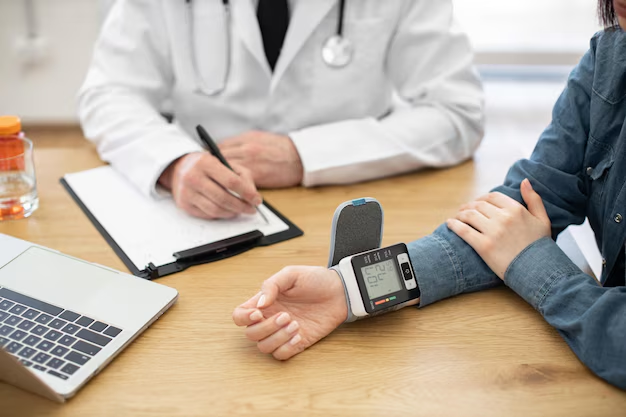Your Guide to How Can Hypertension Be Prevented
What You Get:
Free Guide
Free, helpful information about HyperTension FAQ and related How Can Hypertension Be Prevented topics.
Helpful Information
Get clear and easy-to-understand details about How Can Hypertension Be Prevented topics and resources.
Personalized Offers
Answer a few optional questions to receive offers or information related to HyperTension FAQ. The survey is optional and not required to access your free guide.
Discover Effective Ways to Prevent Hypertension
Hypertension, commonly known as high blood pressure, affects millions worldwide, often sneaking in like a silent predator with minimal symptoms. Yet, its impacts can be profound, leading to heart disease, stroke, and other serious conditions. Understanding how to prevent hypertension is crucial for maintaining a heart-healthy life.
Embrace a Balanced Diet
Food plays a pivotal role in managing blood pressure. Aim for a diet rich in fruits, vegetables, whole grains, and lean proteins. The DASH diet—Dietary Approaches to Stop Hypertension—is specifically designed to help lower blood pressure. It highlights:
- Reduced sodium intake: Limit processed foods, canned soups, and salty snacks.
- Increased potassium: Eat bananas, oranges, sweet potatoes, and spinach.
- Lean proteins and low-fat dairy products.
Maintain a Healthy Weight
Carrying extra weight puts a strain on your heart. Losing even a small amount can help manage blood pressure. Engage in regular physical activity such as brisk walking, cycling, or swimming for at least 30 minutes most days of the week. Not only does this help with weight control, but it also strengthens your heart.
Regular Physical Activity
Beyond weight maintenance, consistent exercise can lower high blood pressure by enhancing heart strength, allowing it to pump more blood with less effort. Aim to include activities like:
- Aerobic exercises
- Strength training
- Flexibility exercises
Manage Stress
Chronic stress can contribute to hypertension. Learning how to manage stress through meditation, deep breathing exercises, yoga, or even listening to music can be beneficial. Setting realistic goals and delegating tasks when feeling overwhelmed can also help reduce stress levels.
Alcohol and Tobacco: Consumption in Check
Both alcohol and tobacco can significantly increase blood pressure. Limiting alcohol intake to moderate levels—up to one drink a day for women and two for men—can help control blood pressure. Quitting smoking, though challenging, offers immediate and long-term heart health benefits.
Routine Health Monitoring
Keeping track of your blood pressure with regular check-ups and home monitoring can alert you to any dangerous changes early. Understanding your numbers can be empowering—discussing them with your healthcare provider can prevent potential health issues.
Explore Financial and Educational Resources
Preventing hypertension doesn't only involve lifestyle changes. Financial stability and access to healthcare resources also play critical roles, especially if you're seeking guidance on how to access the best care or health services.
Consider exploring financial assistance and educational programs that help ensure you have the resources needed for regular health screenings and healthy lifestyle choices:
- Government Health Programs: Medicaid or Medicare may offer coverage for check-ups and medications.
- Private Health Insurance: Investigate what your insurance covers. Some may include gym memberships or nutritionist consultations.
- Educational Grants: If pursuing further education can lead to a better job with health benefits, look for scholarships or grants that could ease the financial burden.
- Debt Relief Options: Programs can help reduce financial stress, indirectly supporting better health outcomes.
By proactively taking steps toward healthier living, you’re investing in a future where hypertension is managed or entirely avoided, improving your overall quality of life.
Financial Assistance and Educational Opportunities 💡
- 🏥 Medicaid/Medicare: Health coverage for eligible persons
- 🍎 Nutritional Assistance: SNAP benefits for purchasing healthy foods
- 🎓 Educational Grants: Pell Grants for qualifying educational pursuits
- 💳 Credit Counseling: Services to manage and reduce debt
- 🚴 Gym Membership Discounts: Offered by some insurers
- 🏠 Housing Assistance Programs: May allow for better economic allocation toward health resources
What You Get:
Free HyperTension FAQ Guide
Free, helpful information about How Can Hypertension Be Prevented and related resources.

Helpful Information
Get clear, easy-to-understand details about How Can Hypertension Be Prevented topics.

Optional Personalized Offers
Answer a few optional questions to see offers or information related to HyperTension FAQ. Participation is not required to get your free guide.


Discover More
- a 66 Year Old Female With a History Of Hypertension
- Are Eggs Bad For Hypertension
- Are Eggs Good For Hypertension
- Are Endocrine Disorders Causing Hypertension Rare
- Can Adderall Cause Hypertension
- Can Alcohol Cause Hypertension
- Can Allergies Cause Hypertension
- Can Anemci People Get Hypertension
- Can Anemia Cause Hypertension
- Can Antibiotics Cause Hypertension
